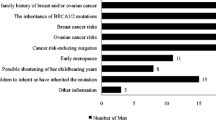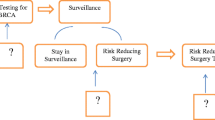Abstract
In families with hereditary breast and ovarian cancer, there is limited knowledge about the reactions of BRCA1/2 mutation positive males. In the present qualitative study, fifteen BRCA1/2 mutation positive men in Norway participated in two successive, in-depth interviews. Seven female partners participated in the second interview. The men reported strong emotional reactions to their positive test results, and they expressed a desire to keep the genetic information private. They considered discussing their test results or health related information with other males as difficult, and they perceived females as their sources of social and emotional support. Interestingly, the second interview revealed important information not communicated during the first interview. The findings of this study contribute to the discussion of whether men who test positive for a BRCA1/2 mutation should receive tailored genetic counseling sessions. Health care providers should be aware of psychological vulnerability in these men, likely stemming from fewer emotional supports in their social networks.
Similar content being viewed by others
References
Act of 5 December No. 100 relating to the application of biotechnology in human medicine etc. http://www.lovdata.com/index-lov.html. Norwegian legislation 2003.
Begg, C. B., Haile, R. W., Borg, A., Malone, K. E., Concannon, P., Thomas, D. C., et al. (2008). Variation of breast cancer risk among BRCA1/2 carriers. Journal of the American Medical Association, 299(2), 194–201.
Blandy, C., Chabal, F., Stoppa-Lyonnet, D., & Julian-Reynier, C. (2003). Testing participation in BRCA1/2-positive families: initiator role of index cases. Genetic Test, 7(3), 225–233.
Bombard, Y., Penziner, E., Decolongon, J., Klimek, M. L., Creighton, S., Suchowersky, O., et al. (2007). Managing genetic discrimination: strategies used by individuals found to have the Huntington disease mutation. Clinical Genetics, 71(3), 220–231.
Bombard, Y., Penziner, E., Suchowersky, O., Guttman, M., Paulsen, J. S., Bottorff, J. L., et al. (2008). Engagement with genetic discrimination: concerns and experiences in the context of Huntington disease. European Journal of Human Genetics, 16(3), 279–289.
Bombard, Y., Veenstra, G., Friedman, J. M., Creighton, S., Currie, L., Paulsen, J. S., et al. (2009). Perceptions of genetic discrimination among people at risk for Huntington’s disease: a cross sectional survey. British Medical Journal, 338, b2175.
Cutcliffe, J. R., & Herth, K. (2002). The concept of hope in nursing 1: its origins, background and nature. British Journal of Nursing, 11(12), 832–840.
d'Agincourt-Canning, L. (2001). Experiences of genetic risk: disclosure and the gendering of responsibility. Bioethics, 15(3), 231–247.
d'Agincourt-Canning, L., & Baird, P. (2006). Genetic testing for hereditary cancers: the impact of gender on interest, uptake and ethical considerations. Critical Reviews in Oncology/Hematology, 58(2), 114–123.
Daly, M. B. (2007). Adressing the needs of men in BRCA1/2 families. Paper presented at the 30th Annual San Antonio Breast Cancer Symposium, San Antonio, Texas, USA.
Daly, M. B. (2008). The impact of social roles on the experience of men in BRCA1/2 families: implications for counseling. Journal of Genetic Counseling.
Daly, P. A., Nolan, C., Green, A., Ormiston, W., Cody, N., McDevitt, T., et al. (2003). Predictive testing for BRCA1 and 2 mutations: a male contribution. Annals of Oncology, 14(4), 549–553.
Dudok de Wit, A. C., Tibben, A., Frets, P. G., Meijers-Heijboer, E. J., Devilee, P., & Niermeijer, M. F. (1996). Males at-risk for the BRCA1 gene, the psychological impact. Psycho-Oncology, 5, 251–257.
Finlay, E., Stopfer, J. E., Burlingame, E., Evans, K. G., Nathanson, K. L., Weber, B. L., et al. (2008). Factors determining dissemination of results and uptake of genetic testing in families with known BRCA1/2 mutations. Genetic Test, 12(1), 81–91.
Forrest, K., Simpson, S. A., Wilson, B. J., van Teijlingen, E. R., McKee, L., Haites, N., et al. (2003). To tell or not to tell: barriers and facilitators in family communication about genetic risk. Clinical Genetics, 64(4), 317–326.
Fuhrer, R., & Stansfeld, S. A. (2002). How gender affects patterns of social relations and their impact on health: a comparison of one or multiple sources of support from “close persons”. Social Science & Medicine, 54(5), 811–825.
Gaff, C. L., Clarke, A. J., Atkinson, P., Sivell, S., Elwyn, G., Iredale, R., et al. (2007). Process and outcome in communication of genetic information within families: a systematic review. European Journal of Human Genetics, 15(10), 999–1011.
Giorgi, A. (1985). Phenomeology and psychological research. Pittsburgh: Duquesne University Press.
Glanz, K., Rimer, B. K., & Lewis, F. M. (2002). Health behavior and health education theory, research, and practice (3rd ed.). San Francisco: Jossey-Bass.
Goffman, E. (1963). Stigma: Notes on the management of spoiled identity. Englewood Cliffs: Prentice-Hall.
Graham, H. & Stacey, M. (1985). Providers, negotiators and mediators: women as the hidden carers.
Green, J., Richards, M., Murton, F., Statham, H., & Hallowell, N. (1997). Family communication and genetic counselling: the case of hereditary breast and ovarian cancer. Journal of Genetic Counseling, 6, 45–60.
Hallowell, N., Ardern-Jones, A., Eeles, R., Foster, C., Lucassen, A., Moynihan, C., et al. (2005a). Communication about genetic testing in families of male BRCA1/2 carriers and non-carriers: patterns, priorities and problems. Clinical Genetics, 67(6), 492–502.
Hallowell, N., Ardern-Jones, A., Eeles, R., Foster, C., Lucassen, A., Moynihan, C., et al. (2005b). Men’s decision-making about predictive BRCA1/2 testing: the role of family. Journal of Genetic Counseling, 14(3), 207–217.
Hallowell, N., Arden-Jones, A., Eeles, R., Foster, C., Lucassen, A., Moynihan, C., et al. (2006). Guilt, blame and responsibility: men’s understanding of their role in the transmission of BRCA1/2 mutations within their family. Sociology of Health Illness, 28(7), 969–988.
Hamann, H. A., Smith, T. W., Smith, K. R., Croyle, R. T., Ruiz, J. M., Kircher, J. C., et al. (2008). Interpersonal responses among sibling dyads tested for BRCA1/BRCA2 gene mutations. Health Psychology, 27(1), 100–109.
King, K. B., Reis, H. T., Porter, L. A., & Norsen, L. H. (1993). Social support and long-term recovery from coronary artery surgery: effects on patients and spouses. Health Psychology, 12(1), 56–63.
Koehly, L. M., Peters, J. A., Kuhn, N., Hoskins, L., Letocha, A., Kenen, R., et al. (2008). Sisters in hereditary breast and ovarian cancer families: communal coping, social integration, and psychological well-being. Psychooncology, 17(8), 812–821.
Kvale, S. (1996). Interviews. An introduction to qualitative research interviewing. SAGE Publications.
Levy-Lahad, E., & Friedman, E. (2007). Cancer risks among BRCA1 and BRCA2 mutation carriers. British Journal of Cancer, 96(1), 11–15.
Liede, A., Metcalfe, K., Hanna, D., Hoodfar, E., Snyder, C., Durham, C., et al. (2000). Evaluation of the needs of male carriers of mutations in BRCA1 or BRCA2 who have undergone genetic counseling. American Journal of Human Genetics, 67(6), 1494–1504.
Liede, A., Karlan, B. Y., & Narod, S. A. (2004). Cancer risks for male carriers of germline mutations in BRCA1 or BRCA2: a review of the literature. Journal of Clinical Oncology, 22(4), 735–742.
Lodder, L., Frets, P. G., Trijsburg, R. W., Tibben, A., Meijers-Heijboer, E. J., Duivenvoorden, H. J., et al. (2001). Men at risk of being a mutation carrier for hereditary breast/ovarian cancer: an exploration of attitudes and psychological functioning during genetic testing. European Journal of Human Genetics, 9(7), 492–500.
Lux, M. P., Fasching, P. A., & Beckmann, M. W. (2006). Hereditary breast and ovarian cancer: review and future perspectives. Journal of Molecular Medecine, 84(1), 16–28.
Mahalik, J. R., Burns, S. M., & Syzdek, M. (2007). Masculinity and perceived normative health behaviors as predictors of men’s health behaviors. Social Science & Medicine, 64(11), 2201–2209.
Malterud, K. (2001). Qualitative research: standards, challenges, and guidelines. Lancet, 358(9280), 483–488.
McAllister, M. F., Evans, D. G., Ormiston, W., & Daly, P. (1998). Men in breast cancer families: a preliminary qualitative study of awareness and experience. Journal Medicine of Genetics, 35(9), 739–744.
McAllister, M., Davies, L., Payne, K., Nicholls, S., Donnai, D., & MacLeod, R. (2007). The emotional effects of genetic diseases: implications for clinical genetics. American Journal of Medical Genetics A, 143A(22), 2651–2661.
McInerney-Leo, A., Biesecker, B. B., Hadley, D. W., Kase, R. G., Giambarresi, T. R., Johnson, E., et al. (2005). BRCA1/2 testing in hereditary breast and ovarian cancer families II: impact on relationships. American Journal of Medical Genetics A, 133(2), 165–169.
Metcalfe, A., Coad, J., Plumridge, G. M., Gill, P., & Farndon, P. (2008). Family communication between children and their parents about inherited genetic conditions: a meta-synthesis of the research. European Journal of Human Genetics, 16(10), 1193–1200.
Mitra, A., Fisher, C., Foster, C. S., Jameson, C., Barbachanno, Y., Bartlett, J., et al. (2008). Prostate cancer in male BRCA1 and BRCA2 mutation carriers has a more aggressive phenotype. British Journal of Cancer, 98(2), 502–507.
Narod, S. A., Neuhausen, S., Vichodez, G., Armel, S., Lynch, H. T., Ghadirian, P., et al. (2008). Rapid progression of prostate cancer in men with a BRCA2 mutation. British Journal of Cancer.
Pfeffer, N. L., Veach, P. M., & LeRoy, B. S. (2003). An investigation of genetic counselors’ discussion of genetic discrimination with cancer risk patients. Journal of Genet Counseling, 12(5), 419–438.
Segal, J., Esplen, M. J., Toner, B., Baedorf, S., Narod, S., & Butler, K. (2004). An investigation of the disclosure process and support needs of BRCA1 and BRCA2 carriers. American Journal of Medical Genetics A, 125(3), 267–272.
Smith, R. A. (2007). Picking a frame for communicating about genetics: stigmas or challenges. Journal of Genetic Counseling, 16(3), 289–298.
Stromsvik, N., Raheim, M., Oyen, N., & Gjengedal, E. (2009). Men in the women’s world of hereditary breast and ovarian cancer-a systematic review. Family Cancer.
Stroup, A. M., & Smith, K. R. (2007). Familial effects of BRCA1 genetic mutation testing: changes in perceived family functioning. Cancer Epidemiology Biomarkers Prevention, 16(1), 135–141.
Taylor, S. (2005). Gender differences in attitudes among those at risk for Huntington’s disease. Genetic Test, 9(2), 152–157.
Taylor, S., Treloar, S., Barlow-Stewart, K., Stranger, M., & Otlowski, M. (2008). Investigating genetic discrimination in Australia: a large-scale survey of clinical genetics clients. Clinical Genetics, 74(1), 20–30.
Tercyak, K. P., Hughes, C., Main, D., Snyder, C., Lynch, J. F., Lynch, H. T., et al. (2001). Parental communication of BRCA1/2 genetic test results to children. Patient Educational and Counseling, 42(3), 213–224.
Thompson, D., & Easton, D. (2001). Variation in cancer risks, by mutation position, in BRCA2 mutation carriers. American Journal of Human Genetics, 68(2), 410–419.
Wagner Costalas, J., Itzen, M., Malick, J., Babb, J. S., Bove, B., Godwin, A. K., et al. (2003). Communication of BRCA1 and BRCA2 results to at-risk relatives: a cancer risk assessment program’s experience. American Journal of Medical Genetics. Part C, Seminars in Medical Genetics, 119(1), 11–18.
Author information
Authors and Affiliations
Corresponding author
Appendix
Appendix
Interview Guide
-
How the genetic testing was initiated in the family
-
Experience with the genetic counseling and testing process
-
Experience with cancer in their family
-
Feelings of being identified as mutation positive
-
Thoughts about cancer risk
-
Family communication and family dynamics
-
Male identity
-
Thoughts about future follow-up programs
The participants were also encouraged to expound upon any other issues important to them.
Rights and permissions
About this article
Cite this article
Strømsvik, N., Råheim, M., Øyen, N. et al. Stigmatization and Male Identity: Norwegian Males’ Experience after Identification as BRCA1/2 Mutation Carriers. J Genet Counsel 19, 360–370 (2010). https://doi.org/10.1007/s10897-010-9293-1
Received:
Accepted:
Published:
Issue Date:
DOI: https://doi.org/10.1007/s10897-010-9293-1




